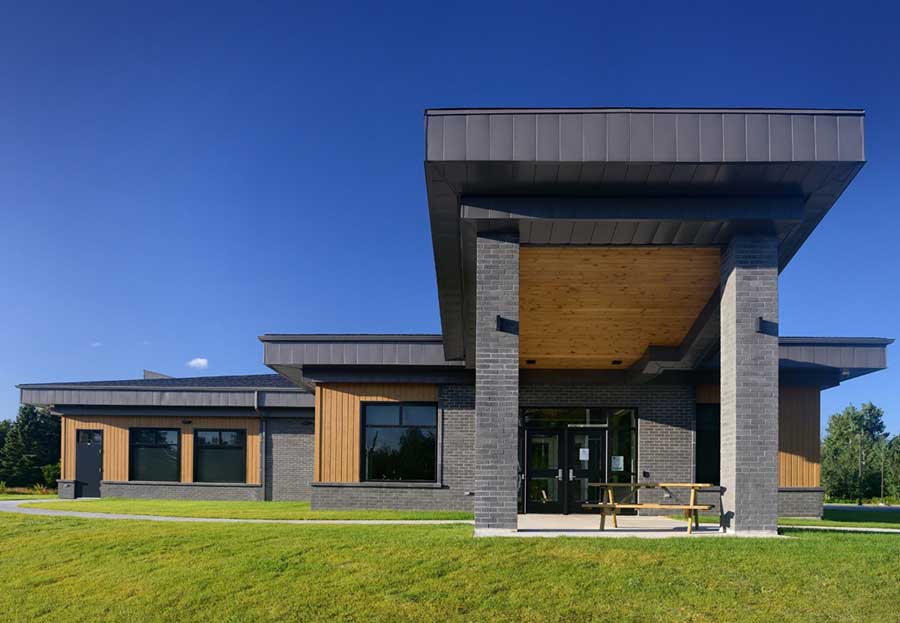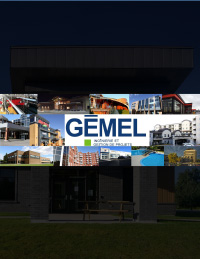A leader in construction & urban infrastructure
By Rajitha Sivakumaran
Are you the owner, builder or investor of a construction project? Whether it is a retirement home with over 200 units in need of redevelopment or the largest arena in the city considering further expansion, Justin Pagé, President of Gémel Inc., invites you to experience the Gémel way. With 63 years of experience in the industry, this engineering consulting firm has emerged as a leader in Québec, specializing in project management, construction, sustainable development and energy efficiency.
“At Gémel, our values govern our decisions, our vision guides our actions and our actions are a testament to our character,” Pagé said.
The present achievements of the company can be traced back to Pagé’s grandfather, Marcel Pagé, who in 1953 founded the company and began work as an electrical contractor. The entrepreneurial spirit of the Pagé family transcended beyond the company’s architect — in 1973, he was joined by his son, Denis Pagé who, being an engineer, incorporated engineering and mechanical projects into the services offered by Gémel. In 1993, Gémel began to focus exclusively on engineering consulting and project management services and a year later, the company emerged as strong as ever under the leadership of the founder’s grandson, making Justin Pagé the third generation owner of a family-built enterprise. Coming from a 15-year-long background in industrial sales, Pagé has been involved with engineering and construction at Gémel for nearly a decade.
Gémel started out in Saguenay, Québec and while the company’s main office is still housed there, years of growth have given rise to branches in Alma, Jonquière, Terrebonne and Shawinigan and have brought in projects across Québec, Ontario and Newfoundland. The company even operates in towns up north, accessible only via airplane, in addition to a few projects in the U.S.
Up to $400 million in construction projects are carried out annually. Notable projects include the Mercedes-Benz building, the Revenue Canada Data Centre, the Agrinova Research Centre and the Hébertville-Station City Hall. Additionally, Gémel has contributed to various high-rise buildings, retirement homes, public swimming pools, fire stations and community centres across Québec.
Satisfying the customer and the environment
According to the mandate of Gémel, a project must simultaneously do three things: respect the environment, be economically feasible and satisfy the requirements of the client. Gémel’s commitment to sustainable development is seen particularly through the steps it takes to respect the environment. Following the LEED philosophy, opting for natural ventilation instead of mechanical, and designing and building a project to maximize the incoming sunlight are such steps. The people inhabiting these spaces benefit too; things like natural lighting create a better workspace, Pagé said. Furthermore, the company uses geothermal energy for heating, upholding its commitment to the environment and giving its clients high energy savings.
“We’re using the environment more and more,” Pagé said.
Gémel is even involved in reducing waste management on construction sites through intensive recycling. Their use of locally available material reduces the environmental footprint of development; every item used from paint to glue is monitored carefully.
Economic feasibility is a must for any commercial venture. Gémel’s ability to excel at meeting clients’ requirements, budgets and timeframes sets it apart from other companies in the industry.
“We sit down with customers and present different options,” Pagé said. Gémel educates its customers about sustainable development, long-term investments and the resulting decreases in operational costs and high energy savings. The end product is thereby a safe, sustainable building.
What makes Gémel especially unique is the large variety of disciplines housed within a single enterprise. Clients have access to specialists with expertise in surveying, civil engineering, architecture, landscaping, structural, building mechanics and electrical engineering. On the management side of things, Gémel staff are equipped to reduce costs, minimize risk, perform project inspections and facilitate trouble-free execution of the project. This singular approach gives the company a competitive edge.
“We start from scratch and we do everything for the customer,” Pagé said.
Life at Gémel
Being the owner, Pagé’s focus lies with training his personnel, but once his employees enter the field, they become self-sufficient individuals. This training has the expected technical side, but it also entails a personal side, where the staff is educated about things that have nothing to do with engineering, such as how to deal with personal issues.
Life at Gémel is far more relaxed than the typical workplace — staff have the option of working at the office or at home. Objectives are given, but the approach taken to meeting these initiatives is very flexible — this fosters both creativity and ingenuity. Oftentimes, teamwork is a necessity, but each team maintains a level of autonomy.
Extracurricular activity at Gémel revolves around charity work. About 20 per cent of profits is given back to the community. This year’s initiatives are focused on autism and autistic children and money is being raised through various events.
Trends in a changing industry
“The industry is changing in the engineering world of Québec,” Pagé said. The trend Pagé has noted in the Québec market is that clients are shifting from large engineering firms with general specializations to smaller firms concentrating on a single area of expertise.
Another trend is an increased need for travel. The dwindling amount of projects in Gémel’s home base is creating a demand for travel in order to seek out-of-the-way ventures and opportunities. Gémel, however, started diversifying their client base a few years before this challenge became a trend — its staff are no strangers to travel. Staying in one place would not be profitable for anyone in engineering at the current time, Pagé said.
“We always thought that we need to diversify and go everywhere, doing what we do best and touching every market. We could’ve stayed only in Saguenay, still touched every market and be unspecialized, but we preferred to be specialized in what we do,” Pagé said.
Despite the volatile nature of the industry, Gémel continues to sail through calm seas. “We’re lucky, I would say. Where we are, everyone’s been downsizing for the past two years and as they’ve been downsizing, we’ve been increasing our business for the past eight years now by an average of 20 per cent every year,” Pagé said.
This growth has set the company on an ambitious route. Expansion out of Québec and into the U.S. and across Canada is expected in the very near future. Presently, the company is intent on purchasing other firms to aid its expansion goals.
www.gemel.ca/en/home







